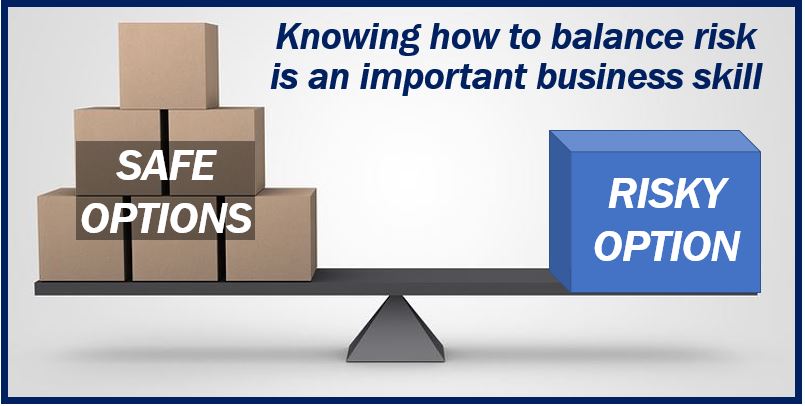 Dealing with risks is an inevitable part of running a business. It’s even in the definition. According to the Oxford Dictionary, an entrepreneur is “a person who sets up a business or businesses, taking on financial risks in the hope of profit.”
Dealing with risks is an inevitable part of running a business. It’s even in the definition. According to the Oxford Dictionary, an entrepreneur is “a person who sets up a business or businesses, taking on financial risks in the hope of profit.”
However, there is no fixed recipe for how many risks you should take when starting your business because there are success stories for both sides. On the one hand, you have entrepreneurs like Richard Branson, Jeff Bezos, and Vera Wang, who may inspire you to sacrifice everything and make bold business decisions. Then, on the other hand, many experts preach caution in the beginning and recommend taking the less exciting, but safer path.
When you’re just starting your business journey and you haven’t fully developed your entrepreneurial skills yet, balancing these two sides can be very confusing. So, how do you know when to be a risk-taker and when to stay in a safe space? Here are a few things to consider:
Start with small risks
Many influential companies have become so famous because their founders took a huge leap of faith and risk everything on a bold business move that had little chance of success. Stories like Arianna Huffington’s, who risked a stable career as a writer to start her own media platform, or Elon Musk’s, whose entire career is based on bold, visionary moves. But, as inspirational as they might be, these stories are very rare – that’s why they became so famous.
 So, take the idea of risk with a grain of salt and don’t be a thrill seeker just for the sake of it because calculating how much you can afford to risk makes the difference between a new entrepreneur and a seasoned one.
So, take the idea of risk with a grain of salt and don’t be a thrill seeker just for the sake of it because calculating how much you can afford to risk makes the difference between a new entrepreneur and a seasoned one.
If you haven’t developed a risk mentality yet, you don’t have to rush towards reckless expansion without a plan. Start with smaller risks first, so that you can get better at mitigating their impact and controlling your reaction to potential failure. In time, you will get better at balancing risk and caution and calculate just how far you can go.
Always have a backup plan
Risk may be a part of business, but that doesn’t mean it’s some kind of chaotic force that’s completely out of your control. On the contrary, most types of risks can be prevented and, if not, you can prepare for them.
The first and most important way to do that is by having business insurance. According to insurers, the damages caused by the loss, theft, or destruction of company property can cripple your business even if your model was innovative and you worked in a lucrative industry. Running a business and taking big picture decisions is risky enough as it is and you shouldn’t add other potential losses to that.
Every type of business, whether it’s a restaurant, retail store, warehouse, or even a home-based business, carries its own unique risks, and having the right business insurance and protect you from many unpleasant surprises.
Also, no matter what decision you take, be aware that failure is always an option, so have a contingency plan in place. Even if it’s not bulletproofed, and it can’t take the full impact when something goes wrong, you can at least partially protect your business. For example, building relationships with vendors from multiple countries can reduce risks in your supply chain and if one of your supplies goes out of business, your activity won’t be affected.
Networking and observation
The best way to learn how to manage risk and caution is through practice. The second best is by observing other people doing it and documenting their experiences. As an entrepreneur, you’ll need to develop networking skills, not only because this is a great way to meet potential clients and partners, but also because you can learn from them.
If you’re thinking of making a bold business move and you’re not sure how it will turn out, talking to someone from your field who has done the same thing can give you some valuable insights and boost your chances of success. As an entrepreneur, you should never stop learning from clients, business partners, and especially from competitors.
Hire a consultant
Popular culture tends to depict entrepreneurs as savvy, self-confident individuals but real-life entrepreneurs have strengths and weaknesses just like everyone else. In business, it’s a sign of wisdom to admit that you don’t have enough experience yet and ask for help before taking a risk. Do you have many innovative ideas but you’re not sure if all of them are feasible? Don’t hesitate to hire a consultant.
They can help you figure out when taking a risk is worth it and when it’s wiser to wait. For example, if you’ve been thinking of opening a new branch abroad, you should hire a professional consultant who knows the target market and can conduct a thorough PESTEL analysis. Successful entrepreneurs often make it seem like they’re running a one-man show, but, more often than not, behind their success there is an entire team of experts who help them calculate risk.
Stay informed
Your business is a commercial entity that exists in relation to many other factors, such as the country’s economy, political regime, social norms, and so on. This correlation causes a series of external risks: micro risks, which affect only one specific industry, and macro risks, which affect the entire economy. So, even if internally you are running your business by the book, some of your decisions may be risky considering the current political or economic climate.
Controlling external risk factors is impossible, but a savvy entrepreneur should take every measure to prepare for them. Staying up to date with the news, looking at industry reports, analyzing reports from authoritative institutions, can help you get a better understanding of your field, so that when you do take risks, you do so in the most favorable moment possible.
Video – What is a economic risk?
________________________________________
Interesting related article: “What is an Entrepreneur?“

